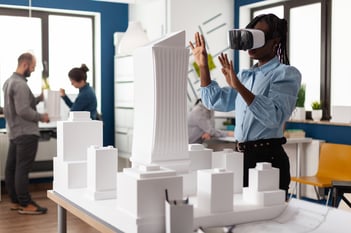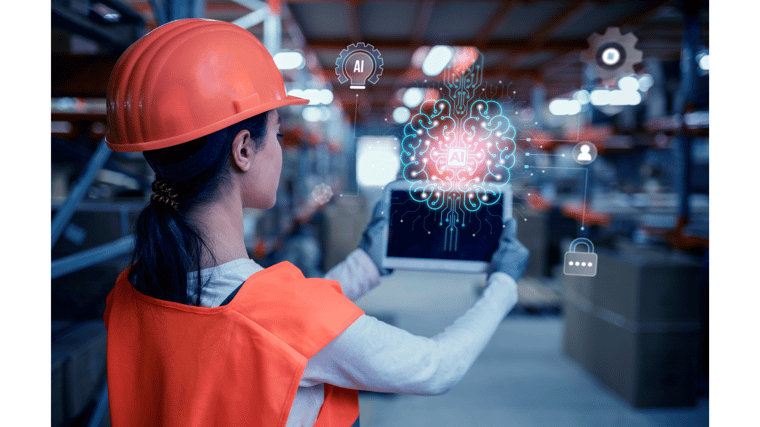intelligence (AI).
AI has offered innovative solutions, increased efficiency and reduced costs, as well as heightened accuracy and saved time. It has revolutionized the way projects are planned, managed and executed.
With AI, construction companies can unlock new opportunities, improve their existing processes and stay ahead of the competition. Want to find out how?
Read: 4 Ways Technology is Holding Your Construction Firm Back
Improved Planning and Design
Planning and design are vital phases of construction. However, traditional processes involve numerous variables and complex calculations, which can be time-consuming and prone to errors. AI can change all that.
AI is known for processing vast amounts of information and data. It can analyze data from previous projects and identify areas to reduce costs and improve efficiency, saving time, money and resources. But we’ll touch more on that in a bit.
The main benefit of using AI in construction is that it can generate design solutions quickly and accurately. Generative design is an AI software that creates numerous design variations based on specific parameters and constraints, like materials, cost and performance requirements. Each variation can feature enhanced qualities or new improvements, reducing design flaws. Architects and engineers can then choose the most suitable design from these options, saving time and leading to more innovative and efficient designs.
Building Information Modeling (BIM) is another crucial tool for architects, engineers and construction professionals. It creates a precise 3D digital representation of a building, which includes detailed information about its components and systems. Professionals can efficiently plan, design, build, manage and repair buildings and infrastructures. BIM also uses complex data sets to simulate and analyze various construction scenarios, helping teams optimize building designs and processes, as well as visualize the entire project and identify potential conflicts before construction begins. This leads to better team coordination. maximum efficiency and reduced errors and rework.
Project Management and Scheduling
Project managers oversee and manage complex, fast-paced projects. Completing these projects can be time-consuming and susceptible to errors, since keeping an eye on all the updates, changes and delays can be difficult. That’s why efficient project management is essential for a successful construction project, and AI can vastly improve this area.
Project management tools can analyze historical project data to predict potential delays, cost overruns and bottlenecks, allowing project managers to make informed decisions and adjust schedules accordingly. Some AI can even suggest solutions themselves, helping companies stay on track and within budget.
AI-driven scheduling systems optimize budgets and resource allocation, ensuring that equipment, materials and labor are all utilized efficiently and productively. Real-time monitoring and data analysis helps managers make timely adjustments.
Robotic processing automation (RPA) can automate mundane construction tasks, minimizing errors and freeing up valuable worker time. AI automation can also delegate tasks and optimize workflows, enabling workers to concentrate on their specialized areas and enhance productivity.
Safety and Risk Management
Safety is a top priority in the construction industry – 150,000 injuries occur on construction sites annually. AI can drastically improve safety measures and transform job sites into “smart sites.”
AI-powered cameras, sensors and drones can remotely monitor job sites 24/7, identifying potential safety hazards and unsafe, non-compliant worker behavior. It can then alert workers and supervisors in real-time so they can take corrective actions, reducing accidents and minimizing downtime and liability. AI can also monitor the quality of construction materials and identify defects or weaknesses. This can provide high quality control, ensuring projects meet required standards.
AI can analyze reports and historical data to assess project risks and prioritize issues based on rankings. Companies can then proactively address safety concerns and focus their time and resources on the most significant risks, as well as develop risk mitigation strategies and make informed decisions about project financing and insurance.
Predictive Analytics and Maintenance
Maintaining equipment and machinery is essential for running projects smoothly. Unplanned equipment downtime can be a significant challenge for any business.
AI can use historical data to predict when maintenance is required, reducing downtime and ensuring machines operate at peak efficiency. It can also improve equipment performance and extend the lifespan of assets, leading to significant cost savings.
By identifying issues before they become critical, project managers can schedule maintenance and repairs at optimal times that minimize downtime and keep repair costs on schedule and within budget.
Sustainability and Energy Efficiency
Sustainability is a concern in many industries, and construction is no exception. AI can significantly contribute to sustainable and green practices by analyzing weather data, occupancy patterns, energy consumption, emissions and other environmental factors to optimize building performance and material usage. AI can also help select sustainable materials and construction methods, leading to more energy-efficient designs and lower operational costs. Companies that want to reduce waste and their carbon footprint can also optimize energy usage in buildings by using AI.
Enhance Your Construction Company with AI
Don’t fall behind and become outdated. Work with Thriveonto ensure you have implemented AI into your modern workplace with services in place for the construction industry. Our fractional CIOs are building policies and strategies on how to properly implement AI so our clients can leap ahead of the competition and improve productivity and efficiency.
For more information, schedule a meeting with us today.

